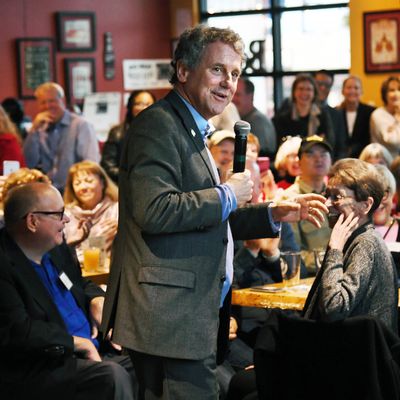
In one of the more surprising and significant decisions of the formative period of the Democratic presidential nominating contest, Ohio senator Sherrod Brown announced to reporters today that he would not be running for the presidency in 2020.
He didn’t really explain his decision, beyond expressing an interest in continuing his Senate career. He had one very publicly ventilated problem in his background — a domestic-abuse allegation stemming from a messy 1986 divorce — but it didn’t seem to help his opponents in Ohio, and his ex-wife has endorsed and praised him. He (along with Elizabeth Warren) also had to contend with complaints that if he was elected he’d cost their party a Senate seat (because Ohio and Massachusetts have Republican governors), but that hardly seemed a major problem since it would have involved driving Donald Trump from the White House.
And to many observers, Brown seemed to have a very good chance to do just that. My colleague Gabriel Debenedetti usefully summed up Brown’s appeal:
Almost every national article written about Brown describes him as “rumpled,” which is kind of true, and calls his voice a “gravelly rasp” (he does sound like he’s constantly growling).
Of course, his look is part of his long-cultivated reputation as a populist anti-hero, and, in the 2020 context, it’s related to his bet that the party may be looking for that kind of not-too-slick, relatable face — a less outsider-y Bernie Sanders and less corporate Joe Biden. Or at least a slightly younger one. Not that Brown is, technically, any kind of outsider: He’s 66, he’s been in Washington for 25 years and in elected office for 43. He was an under-the-radar finalist to be Hillary Clinton’s running mate.
In some respects Brown did seem to thread the needle as a rigorous progressive with demonstrated appeal in the Rust Belt region thought by many to be the key to a 2020 Democratic victory (he was reelected easily last year in a state that Trump carried by eight points). He didn’t have Biden’s long history of policy heresies punctuated by gaffes, or Amy Klobuchar’s alleged personality issues, or Bernie Sanders’s under-explored past as a supporter of international socialist causes. Yes, he shared with Sanders a tendency to agree with Trump on the trade issue (Brown’s systematic opposition to every international trade agreement in sight has been a signature), but all in all, he looked like a potential major player for 2020.
But the word “potential” should be emphasized: In Morning Consult’s latest poll of 2020 candidates, Brown barely registered; he was tied for 9th place with early state primary voters, and 11th with all Democratic primary voters, with the support of just one percent of respondents in both categories. In the same poll his favorability rating was a positive if not that impressive 23/8, with 44 percent saying they’d never heard of him. Brown had a long way to go in fulfilling his potential as a candidate, and maybe the road just looked too perilous. Or perhaps he just didn’t like what he heard during a recent “listening tour” in early primary states that was thought to be a prelude to formal candidacy.
Brown’s demurral is presumably a boon for Biden (still mulling a decision to run) and Klobuchar, who are thought to share the Ohioan’s ability to appeal to the white working-class voters Democrats have been losing by ever-increasing margins, and perhaps for Sanders, who shares Brown’s general ideological profile and is already building up a formidable head of steam. More generally, after appearing to expand almost exponentially, the 2020 field (with recent withdrawals by Eric Holder and Michael Bloomberg along with Brown’s) may be stabilizing or even shrinking. And that could help any number of candidates otherwise in danger of disappearing in the crowd.






























